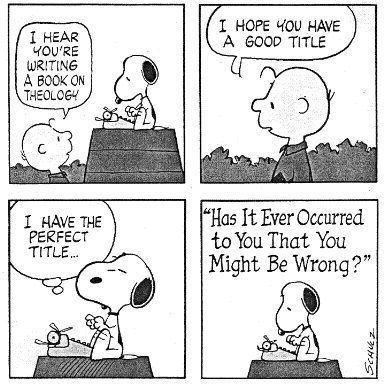How to be really great
Your life will be immeasurably great — incalculably awesome — if you put others in place of … you. We will be great if we put others before us. That is, if we put them first.
One week at church, a pastor culled some points from a book on Christian living, and noted that not only do our particular personalities and approaches to life differ relative to our strengths and our weaknesses — but that our strengths are actually the source of our weaknesses. Our greatest abilities are the wellspring of our deepest flaws — and thus our most grievous sins.
I had thought on this a time or two before, so I could “skip a bit, brother” and work with his ideas even as he was presenting them. I saw how one level down from even the good observation (that is, saying that our strengths and weaknesses are integral and connected) is: all strengths become weaknesses based on one, single difference.
There was one (and only one) reason any strength morphed into a flaw, and then to sin.
No matter what personality type, no matter what the individual strengths or weakness — and no matter how they’re combined, whether that strength was a source of saintliness or sin, was solely due to whether or not the person with those traits lived mainly for himself or for others.
That was the whole dealio, as my daughter says.
Take any strength — leadership, say — and if you marshal it for self-aggrandizement, “personal growth” as the motivational kids say, the result is sin: abuse of authority, narcissism, pride, etc.
But if this ability to lead was used for others, if applied in self-sacrifice and a life of service — let us call it diakonos + doulos — it spawned true greatness.
By love of others doth our soul grow to immense proportion.
By love of self does it shrink to a shuffling shade of hell, miniscule to the nth degree.
‡
In Mark 10, Jesus asks the same question twice, quickly — just 15 verses separate the moments — and He receives different answers each time.
James and John approach Him, wondering who gets to be vice-Christ in Heaven, and Jesus asks, “What do you want me to do for you?” A little later He asks the same of a blind beggar braying at him — a trifecta of inappropriate if ever there was one.
The Sons of Thunder know exactly what they want. They want Jesus to give, “whatever we ask.”
They are clearly focused on who gets the juice someday. And Jesus genially replies, ”OK fellas … such as?” In the next verse they demand honor, while tossing Christ a bone: ”in your glory.”
Jesus, as He usually does, sees right through it, and suggests that getting what Jesus is going to get (they are on their way to Jerusalem) is not a thing they should be demanding, and certainly not lightly. And the other disciples are more than a little ticked at the brothers.
‡
Then again, Bartimaeus is no shrinking violet either.
He is shouting at the Lord. Everyone else is shushing him. Clearly this guy does not know the pecking order: if you’re blind or begging or both, fuggedaboutit. “Well I never!” or “How rude!” And suchlike. So he shouts more and louder.
The Lord asks for him … and suddenly, those who were giving Bartimaeus the high hat, maybe throwing a spare robe over him to muffle the sound, are gabbling all over themselves to be part of the solution: “Lucky you, bro.” and “C’mon now, get up there!” … And suchlike.
The Lord asks the rude and sightless beggar the same question He just posed to two men Christ is training for ministry, men undeniably marked out for great things. And Bartimaeus seems to request something only for himself, too: his sight.
So James, John, and Bart — each and all — seem to be about their craven business. I shall alert the media. But I think Jesus saw something different: Bartimaeus requests an internal integrity, a personal wholeness — and not to be given say over others’ lives.
Or maybe it was that Bartimaeus asked to be enabled, without demanding any defined outcome. He wanted to see but he didn’t specifically ask his life be made perfect — and it’s unlikely it was. But James and John wanted the endgame decided right now — and it’s just as unlikely this ever will be done.
As T. S. Eliot said, “For us there is only the trying. The rest is not our business.” Either way, Christ saw something different, because He granted the request.
And one last thing: right after he gets his sight back, the blind beggar followed Jesus on the way.
And you may say, “Yes, but James and John already were following Him!”
Yes, I noticed that as well.
